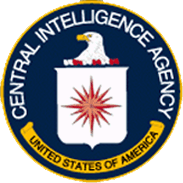 The Central Intelligence Agency (CIA) is one of several organizations responsible for gathering and evaluating foreign intelligence information vital to the security of the United States. It is also charged with coordinating the work of other agencies in the intelligence community
including the National Security Agency and the Defense Intelligence Agency. It was established by the National Security Act of 1947, replacing the wartime Office of Strategic Services.
The CIA's specific tasks include: advising the president and the National Security Council on international developments; conducting research in political, economic, scientific, technical, military, and other fields; carrying on counterintelligence activities outside the United States; monitoring foreign radio and television broadcasts; and engaging in more direct forms of espionage and other intelligence operations.
Throughout its history the CIA has seldom been free from controversy. In the 1950s, at the height of the cold war and under the direction of Allen Welsh Dulles, its activities expanded to include many undercover operations. It subsidized political leaders in other countries; secretly recruited the services of trade-union, church, and youth leaders, along with businesspeople, journalists, academics, and even underworld leaders; set up radio stations and news services; and financed cultural organizations and journals.
After the failure of the CIA-sponsored Bay of Pigs invasion of Cuba in 1961, the agency was reorganized. In the mid-1970s a Senate Select Committee and a Presidential Commission headed by Nelson Rockefeller investigated charges of illegal CIA activities. Among other things, they found that the CIA had tried to assassinate several foreign leaders, including Fidel Castro of Cuba. It had tried to prevent Salvador Allende from winning the 1970 elections in Chile and afterward had worked to topple him from power.
Between 1950 and 1973 the CIA had also carried on extensive mind-control experiments at universities, prisons, and hospitals. In 1977, President Jimmy Carter directed that tighter restrictions be placed on CIA clandestine operations. Controls were later also placed on the use of intrusive surveillance methods against U.S. citizens and resident aliens.
Late in the 1970s, however, fears arose that restraints on the CIA had undermined national security. The agency's failure to foresee the revolution in Iran (1979) gave new impetus to efforts at revitalization. President Ronald Reagan and his CIA director, William J. Casey, loosened many of the restrictions, but such activities as the mining of Nicaraguan harbors in 1984 as part of the covert campaign in support of the Contra rebels and the still-unclear role of the CIA in the Iran-contra affair focused renewed public attention on the agency.
Following Casey's death in 1987, Reagan appointed William Webster, director of the Federal Bureau of Investigation, to be the CIA director. His reputation for integrity helped restore the agency's image, but intelligence failures during the Persian Gulf War (1991) tarnished his tenure. He was succeeded by Robert M. Gates (1991-93), James Woolsey (1993-94), John Deutch (1995-96), and George J. Tenet (1997-).
In 1994, in the worst spy scandal in CIA history, a career officer, Aldrich H. Ames, was arrested by the Federal Bureau of Investigation and admitted spying for the Union of Soviet Socialist Republics and Russia for nine years. Woolsey resigned under fire and, after disclosure in 1995 of clandestine CIA links to U.S. government-proscribed death squads in Guatemala, was succeeded by Deputy Secretary of Defense John Deutch, who immediately retired much of the agency's hierarchy. Deutch who served until the beginning of Bill Clinton's second administration made significant reforms to correct agency deficiencies. |